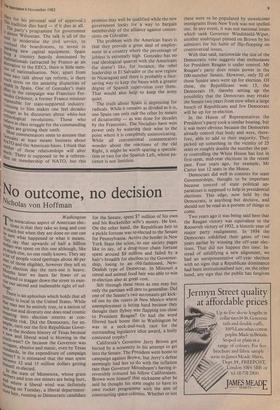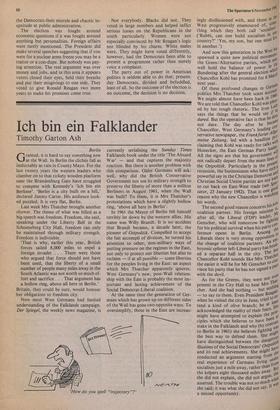No outcome, no decision
• •
Nl
cholas von Hoffman
Washington Washington
he miraculous aspect of American elec-
Pr t,, tions is that they take so long and cost ;" Much but when they are done no one can ''rch.sure what happened or what it means. doll saY that upwards of half a billion so—ars was spent on this one although, like a irnlich else, no one really knows. They say ee„°,t of People voted (perhaps about 40 per el4 of those eligible), however they tell us k,etY election day the turn-out is heavy. inhered later we learn far fewer of us eiusethered to stagger down the street to exer- rage, °ur sacred and inalienable right of suf- ' DI:here is an aphorism which holds that all :titles is local in the United States. While suallnaY not be entirely true, in a nation of alea`11,,ize and diversity one does read cosmic ski '''n8 into election returns at con- a,,.erable risk. Did the Democrats, for ex- 170 Dle, turn out the first Republican Gover- a rne In the modern history of Texas because sow and liberal wind is blowing in the ar,Uth-west? Or because the Governor was st'Nant, abusive and manic, even by Texas alandards, in the expenditure of campaign eueY? It is estimated that the man spent fli•tween 12 and 15 million dollars getting 411 self re-elected. fah...11 the state of Minnesota, whose grain a.'", ers and iron ore miners are being hurt, br where a liberal wind was definitely str"re,1118 on Tuesday, a liberal department-
heir, running as Democratic candidate for the Senate, spent $7 million of his own and his Rockefeller wife's money. He lost. On the other hand, the Republican heir to a pickle fortune was re-elected to the Senate for Pennsylvania. Across the border in New York State the scion, as our society pages like to say, of a drug-store chain fortune spent around $9 million and failed by a hair's breadth for election to the Governor- ship, losing to an old-fashioned, New- Dealish type of Democrat. In Missouri a cereal and animal food heir was able to win re-election also at great cost.
Sift through these races as one may but only the partisan will care to generalise. Did one of the Senate's two astronauts get kick- ed out by the voters in New Mexico where unemployment is biting hard because they thought their flyboy was flapping too close to President Reagan? Or had the word filtered back home that in Washington he was in a neck-and-neck race for the outstanding legislative idiot award, a hotly contested trophy?
California's Governor Jerry Brown got buried by a nonentity in his attempt to get into the Senate. The President went home to campaign against Brown, but Jerry's defeat seemingly had less to do with the inflation rate than Governor Moonbeam's having ir- reversibly irritated his fellow Californians. Brown won himself that nickname after he said he thought his state ought to have its own rocket programme with the aim of constructing space colonies. Whether or not these were to be populated by unwelcome immigrants from New York was not spelled out. In any event, it was not national issues which sank Governor Windshield-Wiper, another soubriquet pinned on Brown by his admirers for his habit of flip-flopping on controversial issues.
With that said, nationwide the size of the Democratic vote suggests that enthusiasm for President Reagan is under control. Mr Reagan's party does retain power in the 100-member Senate. However, only 32 of those Senate seats were up for election. Of these, the Republicans won 13, the Democrats 19, thereby setting up the possibility that the Democrats may retake the Senate two years from now when a large bunch of Republicans and few Democrats will be up for re-election.
In the House of Representatives the President's party took a similar beating, but it was more obvious because the Democrats already control that body and were, there- fore, able to add to their majority. They picked up something in the vicinity of 25 seats or roughly double the number the par- ty controlling the White House has lost in first-term, mid-year elections in the recent past. Four years ago, for example, Mr Carter lost 12 seats in the House.
Democrats did well in contests for state Governorships, thought to be important because control of state political ap- paratuses is supposed to help in presidential elections. This edge, now held by the Democrats, is anything but decisive, and should not be read as a portent of things to come.
Two years ago it was being said here that the Reagan victory was equivalent to the Roosevelt victory of 1932, a historic year of major party realignment. In 1934 the Democrats solidified their gains of two years earlier by winning the off-year elec- tions. That did not happen this time. In- stead of solidifying a new alignment, we had an unrepresentative off-year election with no signs that a Republican dominance had been institutionalised nor, on the other hand, any sign that the public has forgiven the Democrats their misrule and chaotic in- eptitude at public administration.
The election was fought around economic questions if it was fought around anything but personalities. Foreign affairs were rarely mentioned. The President did make several speeches suggesting that if you were for a nuclear arms freeze you may be a traitor or a con-dupe. But nobody was pay- ing attention. The real argument was over money and jobs, and in this area it appears voters closed their eyes, held their breaths and put their misgivings to one side. They voted to give Ronald Reagan two more years to make his promises come true. Not everybody. Blacks did not. They voted in large numbers and helped inflict serious losses on the Republicans in the south particularly. Women were not especially convinced by Mr Reagan's logic nor blinded by his charm. White males were. They might have voted differently, however, had the Democrats been able to present a programme rather than merely voice a complaint.
The party out of power in American politics is seldom able to do that; present- day Democrats, divided and befuddled, least of all. So the outcome of the election is no outcome, the decision is no decision.















































 Previous page
Previous page